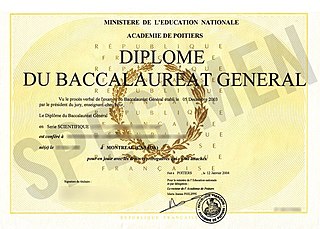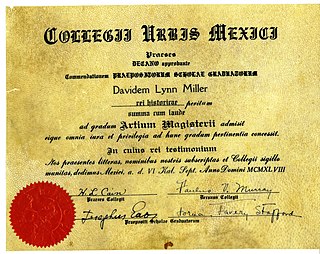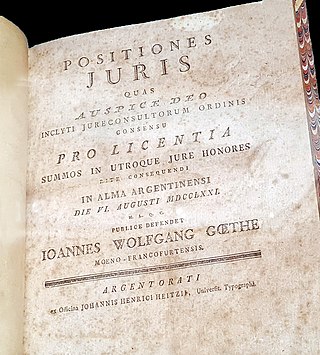An academic degree is a qualification awarded to a student upon successful completion of a course of study in higher education, usually at a college or university. These institutions often offer degrees at various levels, usually divided into undergraduate and postgraduate degrees. The most common undergraduate degree is the bachelor's degree, although some educational systems offer lower-level undergraduate degrees such as associate and foundation degrees. Common postgraduate degrees include engineer's degrees, master's degrees and doctorates.
A bachelor's degree or baccalaureate is an undergraduate degree awarded by colleges and universities upon completion of a course of study lasting three to six years. The two most common bachelor's degrees are the Bachelor of Arts (BA) and the Bachelor of Science. In some institutions and educational systems, certain bachelor's degrees can only be taken as graduate or postgraduate educations after a first degree has been completed, although more commonly the successful completion of a bachelor's degree is a prerequisite for further courses such as a master's or a doctorate.

Undergraduate education is education conducted after secondary education and before postgraduate education, usually in a college or university. It typically includes all postsecondary programs up to the level of a bachelor's degree. For example, in the United States, a student pursuing an associate or bachelor's degree is known as an undergraduate student while a student pursuing a master's or doctoral degree is a graduate student. Upon completion of courses and other requirements of an undergraduate program, the student would earn the corresponding degree. In some other educational systems, undergraduate education is postsecondary education up to and including the level of a master's degree; this is the case for some science courses in Britain and some medicine courses in Europe.

The baccalauréat, often known in France colloquially as the bac, is a French national academic qualification that students can obtain at the completion of their secondary education by meeting certain requirements. Though it has only existed in its present form as a school-leaving examination since Emperor Napoleon Bonaparte's implementation on March 17, 1808, its origins date back to the first medieval French universities. According to French law, the baccalaureate is the first academic degree, though it grants the completion of secondary education. Historically, the baccalaureate is administratively supervised by full professors at universities.

A diploma is a document awarded by an educational institution testifying the recipient has graduated by successfully completing their courses of studies. Historically, it has also referred to a charter or official document of diplomacy.

In France, secondary education is in two stages:

A licentiate is an academic degree present in many countries, representing different educational levels. It may be similar to a master's degree when issued by pontifical universities and other universities in Europe, Latin America, and Syria.
The European Baccalaureate is a bilingual educational diploma, which certifies the completion of secondary studies in a European School or Accredited European School by the Board of Governors of the intergovernmental organisation, "The European Schools". The diploma is awarded for the successful achievement of coursework and concomitant examinations which require that students take a minimum of 10 courses as well as be fully proficient in two languages. Students may take up to 14 courses. It is officially recognised as an entry qualification for Higher Education in all the member states of the European Union (EU), as well as in a number of others. All participating countries are legally obligated to ensure EB diploma holders enjoy the same rights and benefits as other holders of secondary school-leaving certificates in their jurisdictions. The name ‘European Baccalaureate’ belongs solely to the European Schools, which, since their establishment, have had a monopoly over its use in all the official languages of the EU.
An engineer's degree is an advanced academic degree in engineering which is conferred in Europe, some countries of Latin America, North Africa and a few institutions in the United States. The degree may require a thesis but always requires a non-abstract project.
A school leaving qualification is an academic qualification awarded for the completion of secondary education. Depending on the country or region, it may alternatively be known as a high school diploma, senior secondary leaving certificate, high schools general certificate or school certificate.
The Welsh Baccalaureate, or Welsh Bacc, is an educational qualification delivered in secondary schools and colleges across Wales. The Welsh Government says that it gives broader experiences than traditional learning programmes, developing transferable skills useful for education and employment. The Welsh Bacc is offered at Advanced, National Foundation and National/Foundation level, and is studied alongside a range of academic and vocational qualifications.
Education in Romania is based on a free-tuition, egalitarian system. Access to free education is guaranteed by Article 32 in the Constitution of Romania. Education is regulated and enforced by the Ministry of National Education. Each step has its own form of organization and is subject to different laws and directives. Since the downfall of the communist regime, the Romanian educational system has gone through several reforms.

The A-level is a subject-based qualification conferred as part of the General Certificate of Education, as well as a school leaving qualification offered by the educational bodies in the United Kingdom and the educational authorities of British Crown dependencies to students completing secondary or pre-university education. They were introduced in England and Wales in 1951 to replace the Higher School Certificate. The A-level permits students to have potential access to a chosen university they applied to with UCAS points. They could be accepted into it should they meet the requirements of the university.
A matriculation examination or matriculation exam is a university entrance examination, which is typically held towards the end of secondary school. After passing the examination, a student receives a school leaving certificate recognising academic qualifications from secondary-level education. Depending on scores or grades achieved, a student may then matriculate to university to take up further studies.
Since gaining independence from France in 1956, the government of Tunisia has focused on developing an education system which produces a solid human capital base that could respond to the changing needs of a developing nation. Sustained structural reform efforts since the early 1990s, prudent macroeconomic policies, and deeper trade integration in the global economy have created an enabling environment for growth. This environment has been conducive to attain positive achievements in the education sector which placed Tunisia ahead of countries with similar income levels, and in a good position to achieve MDGs. According to the HDI 2007, Tunisia is ranked 90 out of 182 countries and is ranked 4th in MENA region just below Israel, Lebanon, and Jordan. Education is the number one priority of the government of Tunisia, with more than 20 percent of government’s budget allocated for education in 2005/06. As of 2006 the public education expenditure as a percentage of GDP stood at 7 percent.

The Tunisian Baccalaureate, or Examen National du Baccalauréat, is a standardized test that was founded in 1891, a decade after the beginning of the French colonization of Tunisia (1881–1956). Students who successfully complete the baccalaureate are assured a place at a university, but not always to study their chosen subjects. The baccalaureate is both a school leaving and a university entrance examination, and the success rate is lower than for other tests of this type; on average, 60 percent of students who take it do not pass.
A high school diploma is a diploma awarded upon graduation of high school. A high school diploma is awarded after completion of courses of studies lasting four years, typically from grade 9 to grade 12. It is the school leaving qualification in the United States and Canada.

Lycée Français Marie Curie de Zurich (LFZ), German: französisches Gymnasium) is a French international school located in the municipality of Dübendorf, with more than 1,145 students from reception to year 13.







